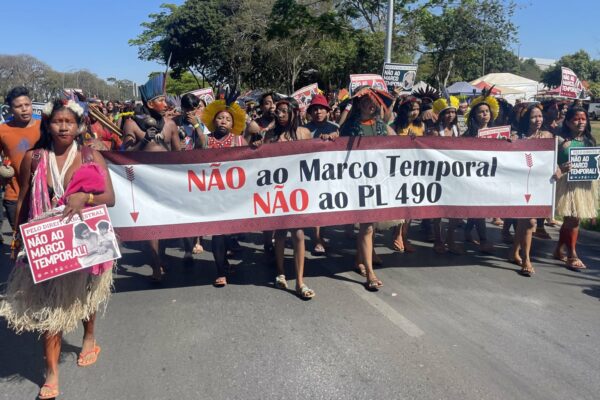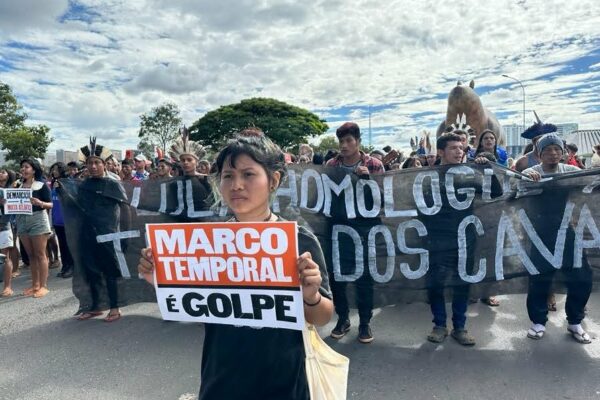New York – As the Colombian government seeks to expand oil and gas drilling to raise production, it is licensing blocks in increasingly remote areas, infringing on the territory of indigenous tribes, according to environmentalists and groups rep- resenting indigenous people.
Today, most of the country’s oil output comes from the Llanos and Magdalena Basins in central Colombia. However, as traditional fields decline, oil companies are increasing activity in more distant regions. In addition, more remote areas have become safer for drilling thanks to government efforts to drive out armed guerillas and demobilize paramilitaries.
In the Putumayo Basin in southwestern Colombia near Ecuador, and in the northeastern provinces of Santander, Norte de Santander and Boyaca on the Venezuelan border – both home to large indigenous populations – oil drilling is on the rise despite opposition from native groups.
In 2006, Bogota authorized US firm Occidental and state-owned Ecopetrol to begin exploration work on protected aboriginal land in the northeast of the country, despite local opposition. Members of the U’wa indigenous group, who live in a protected forest in northeastern Colombia, oppose Ecopetrol’s plans to develop the Gibraltar field, which holds proven gas reserves of 600 billion cubic feet.
Construction has already started on a gas treatment plant near the reservation as well as the TransOriente gas pipeline connecting Gibraltar with the Bucaramanga refinery. Indigenous leaders say the line would pass through the U’wa reserve.
The group is also concerned that oil operations on or near U’wa territory will attract armed groups seeking to benefit from the oil wealth or attack energy companies.
Local peace organizations say that although violence against energy firms and infrastructure has declined, guerillas and former paramilitaries continue to target oil companies in some parts of Colombia through extortion, theft of oil and attacks against pipelines.
The Venezuelan border, near the U’wa reservation, remains one of the most violent regions, where the two main guerilla groups – the Revolutionary Armed Forces of Colombia (FARC) and the National Liberation Army (ELN) – clash over territory.
The conflict draws the military near U’wa territory and guerillas often pass through the mountainous region, laments Roberto Afanador Cobaria, International Coordinator of the U’wa Association of Traditional Councils and Leaders.
Leaders of the U’wa and other indigenous groups say the government refuses to stop drilling in their territory because its priority is to increase revenues by exploiting the region’s natural resources. “The policy of the state is purely economic,” says Gilberto Cobaria Bocota, President of the U’wa Association.
Claiming inadequate protection from the state, indigenous groups have organized on a national level and aligned themselves with international non-governmental organizations, such as Amazon Watch.
In the 1990s, indigenous groups carried out extensive protests against Occidental Petroleum, which operated the Gibraltar field before handing it over to Ecopetrol in 2002.
Amazon Watch also publicly rebuked the US Export Import Bank for offering a $1 billion loan to Ecopetrol.
However, Bocota concedes that because his group is located in such a remote area, traditional action like protests and roadblocks are basically ineffective.
In contrast to Colombia, indigenous opposition to oil drilling has been much more effective in Peru. Last year, indigenous groups in Peru blocked highways, pipelines and rivers in the Amazon in an effort to force the government to revoke decrees that they said would make it easier for oil companies to exploit their lands. The blockades temporarily disrupted oil company operations in the region.
Some demonstrations turned violent, resulting in the deaths of several indigenous people and police officers. The violence ultimately pushed Peru’s lawmakers to revoke the two most controversial decrees (OD Jun.12,p4).
Andrew Miller of Amazon Watch says the conflict between oil companies and indigenous groups will escalate throughout South America as oil exploration increasingly encroaches on still unexploited indigenous lands.













